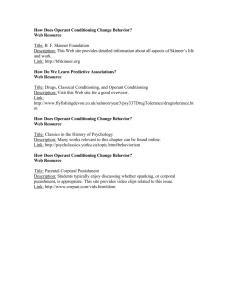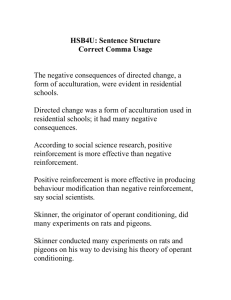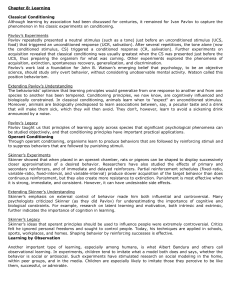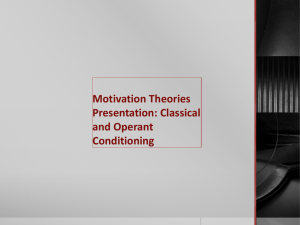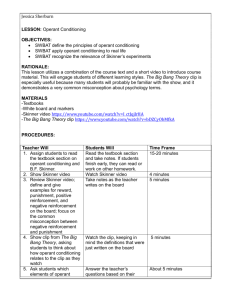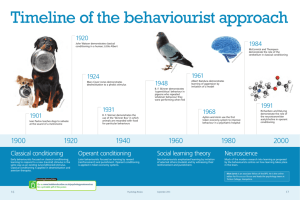Law of behavior classical & operant conditioning
advertisement
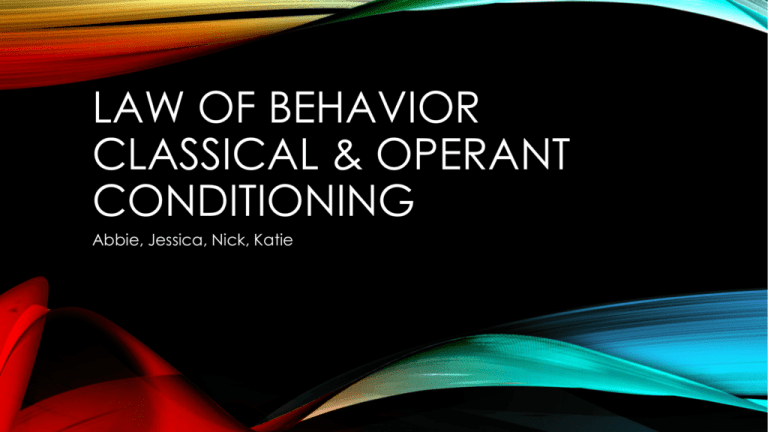
LAW OF BEHAVIOR CLASSICAL & OPERANT CONDITIONING Abbie, Jessica, Nick, Katie OPERANT CONDITIONING Reward and punishment The rewarded behavior will be more likely to happen again Skinner stumbled across what we know today as the skinner box. This box allowed him to collect a record of what the animal picked(reward or punishment). The animal either pressed a lever (food) or a key(shock). He wanted to know why these animals behaved the way that they do. Skinner controlled his experiments by using “Skinner boxes.” PEOPLE OF OPERANT CONDITIONING BF SKINNER (negative, rats) Studied operant condition B.F Skinner studied English Literature and Romance Languages before he got into psychology. His hypothesis was "control the environment and you will see order in behavior" SKINNERS BOX HISTORY OF OPERANT CONDITIONING The scientific study of operant conditioning dates from the beginning of the 20th century with the work of Edward L. Thorndike in the U.S. and C. Lloyd Morgan in the U.K. Graduate student Thorndike’s early experimental work was looking at cats escaping from puzzle boxes. Soon after, the study of operant conditioning, was taken up by what became the dominant movement in American psychology in the first half of the 20th century. Beginning in the 1930’s, Skinner started his experimentation on the behavior of animals. CONTRIBUTIONS TO SOCIETY Skinners discoveries allowed us to understand why we act the way we do. Skinner allowed us to see that we wont do something if it gives us a negative outcome While if something gives us a positive outcome we will keep doing it. If we make someone laugh we will keep doing that thing While if we make someone cry we stop. CLASSICAL CONDITIONING If somethings is associated with a positive reinforcement than that something itself could be used as a positive reinforcement. Watson tested this theory on a 11 month old infant named Albert Before the experiment Albert loved the rats and always wanted to play with them He caused the child to be scared of soft white rats, by showing the baby the rats along with a sharp loud sound that scared the baby. After the experiments Albert was afraid of them. PEOPLE OF CLASSICAL CONDITIONING IVAN PAVLOV (positive, dogs) Won a noble Noble Prize Researched the physiology of digestion which then led to the development of his first experimental model of classical conditioning Studied all kind of animals not just dogs UNCONDITIONED STIMULUS(FOOD)= UNCONDITIONED RESPONSE(SALIVATE) http://www.youtube.com/watch?v=nE8pFWP5Q DM HISTORY OF CLASSICAL CONDITIONING Started in Russia. Studied 1849-1939 Pavlov was originally studying digestion in dogs, but ended up studying why his dogs reacted the way they did. CONTRIBUTIONS TO SOCIETY This study allowed us to understand why when something bad happens we associated that even with something that to any other person is completely unrelated. WORKS CITED • Alexander, Shawn. "Did Skinner Answer Why We Have a Thing Called Religion? | Erwin Fisser." Erwin Fisser. N.p., 9 July 2008. Web. 15 Sept. 2013. • Berk, Laura E. "Chapter Five: Physical Development in Infancy and Toddlerhood." Infants, Children, and Adolescents. Boston: Allyn and Bacon, 1996. N. pag. Print. • "B.F. Skinner." B.F. Skinner. Boundless, n.d. Web. 12 Sept. 2013. • McLeod, Saul. "Pavlov's Dogs." - Simply Psychology. N.p., 2007. Web. 12 Sept. 2013. • "Mental - Blog." : Pavlov, El Sr. De Los Perros.... N.p., n.d. Web. 15 Sept. 2013. • Quigley, Chris. "Quigley's Cabinet." : Pavlov's Dog. N.p., 30 Aug. 2009. Web. 15 Sept. 2013. • Staddon, John E., Dr, and Yael Niv, Dr. "Operant Conditioning." - Scholarpedia. Scholarpedia, 21 Oct. 2011. Web. 12 Sept. 2013.
